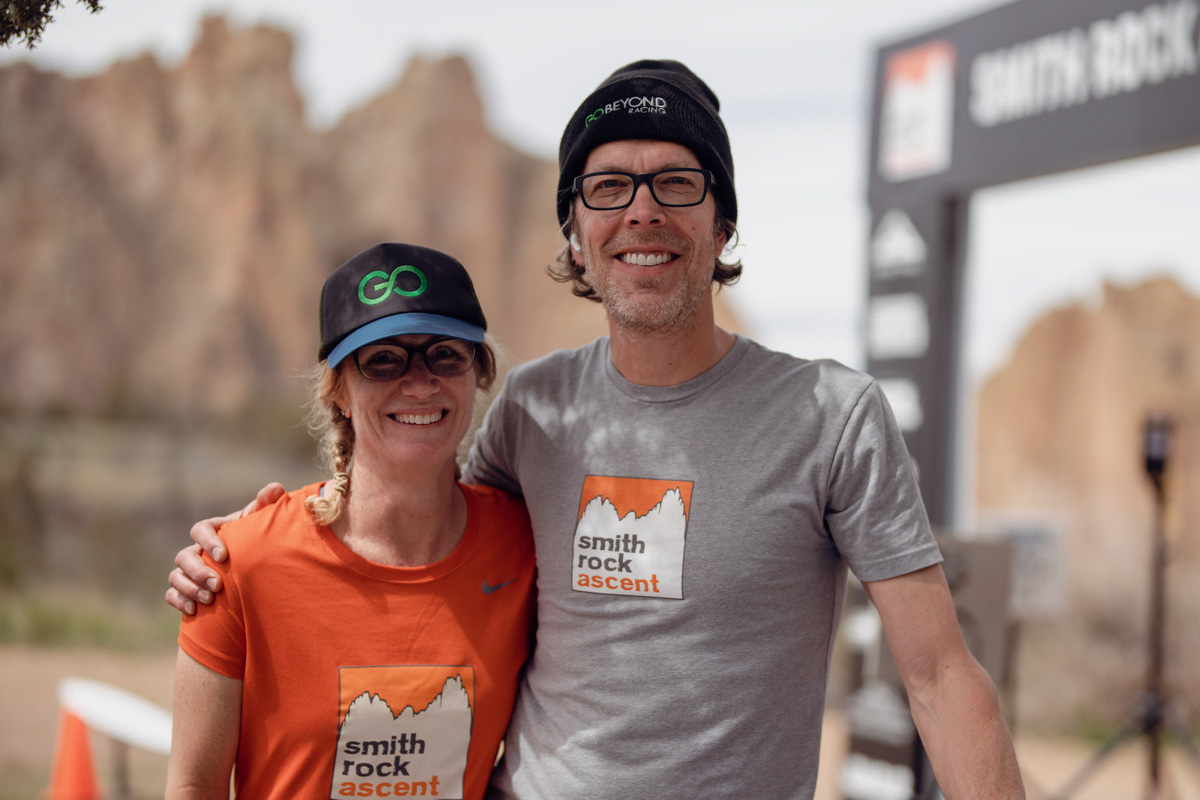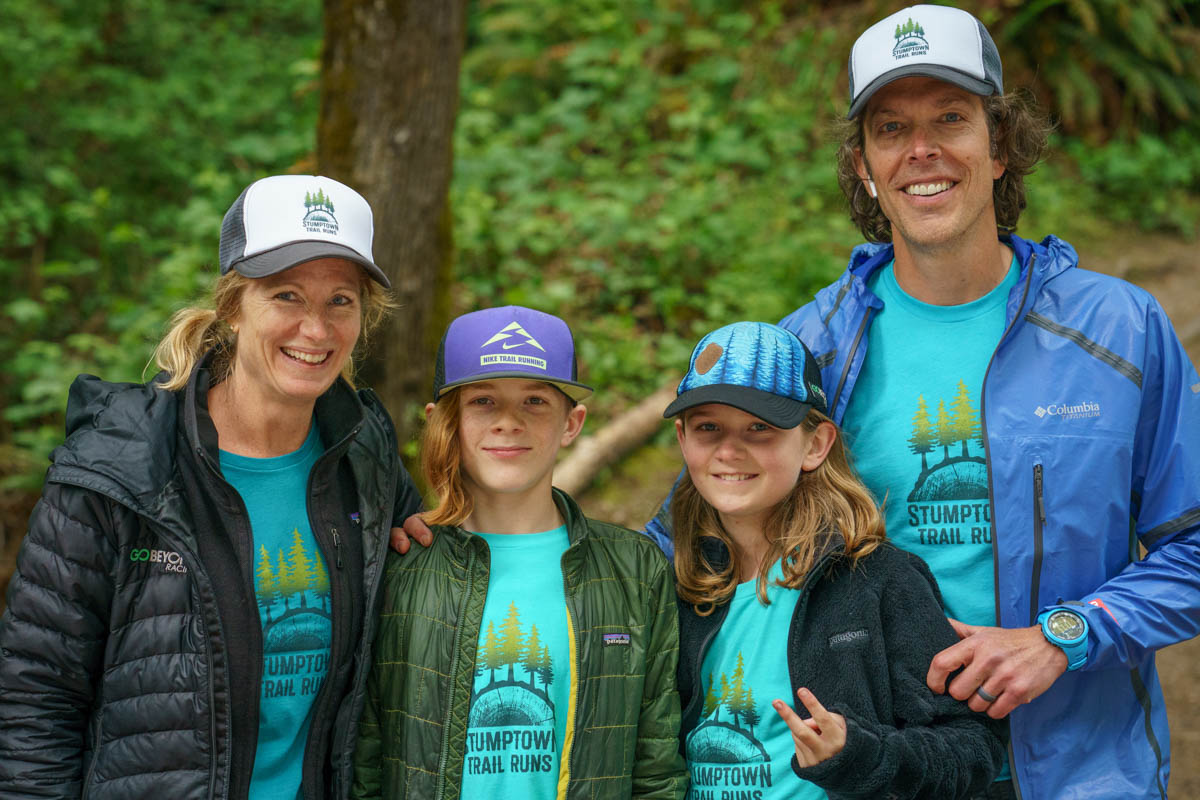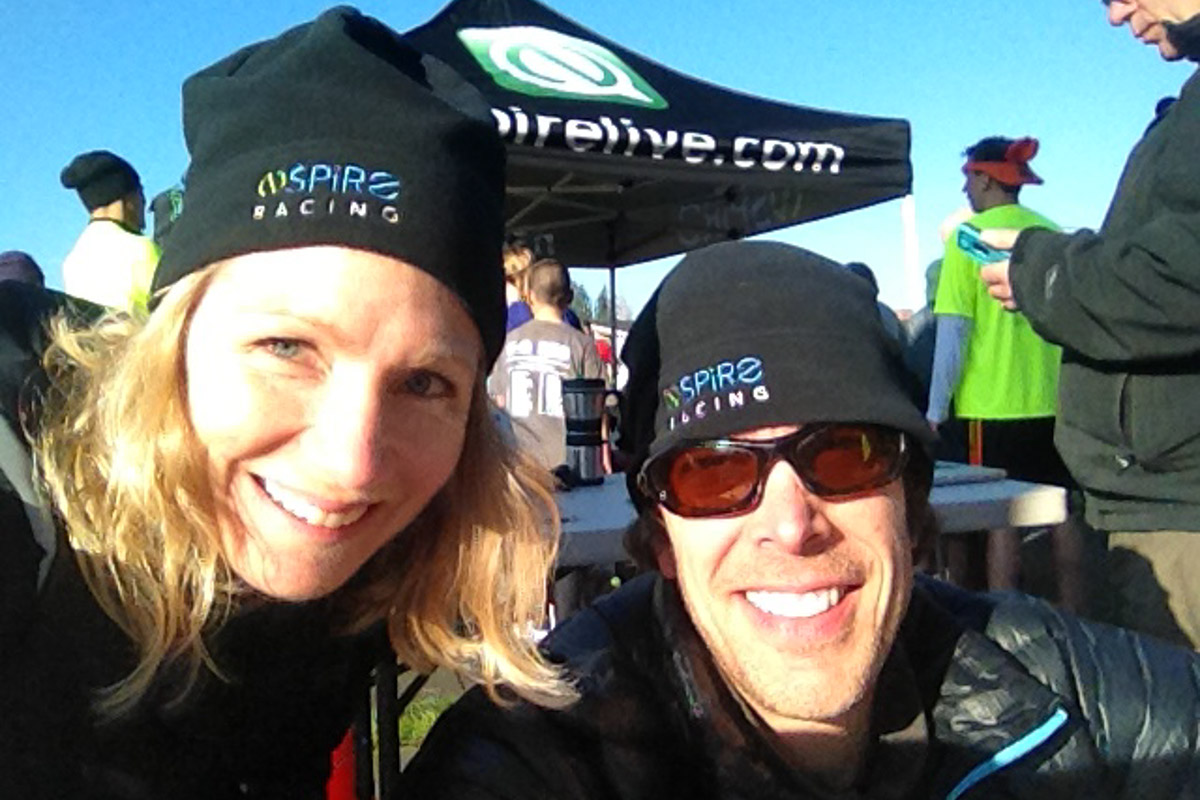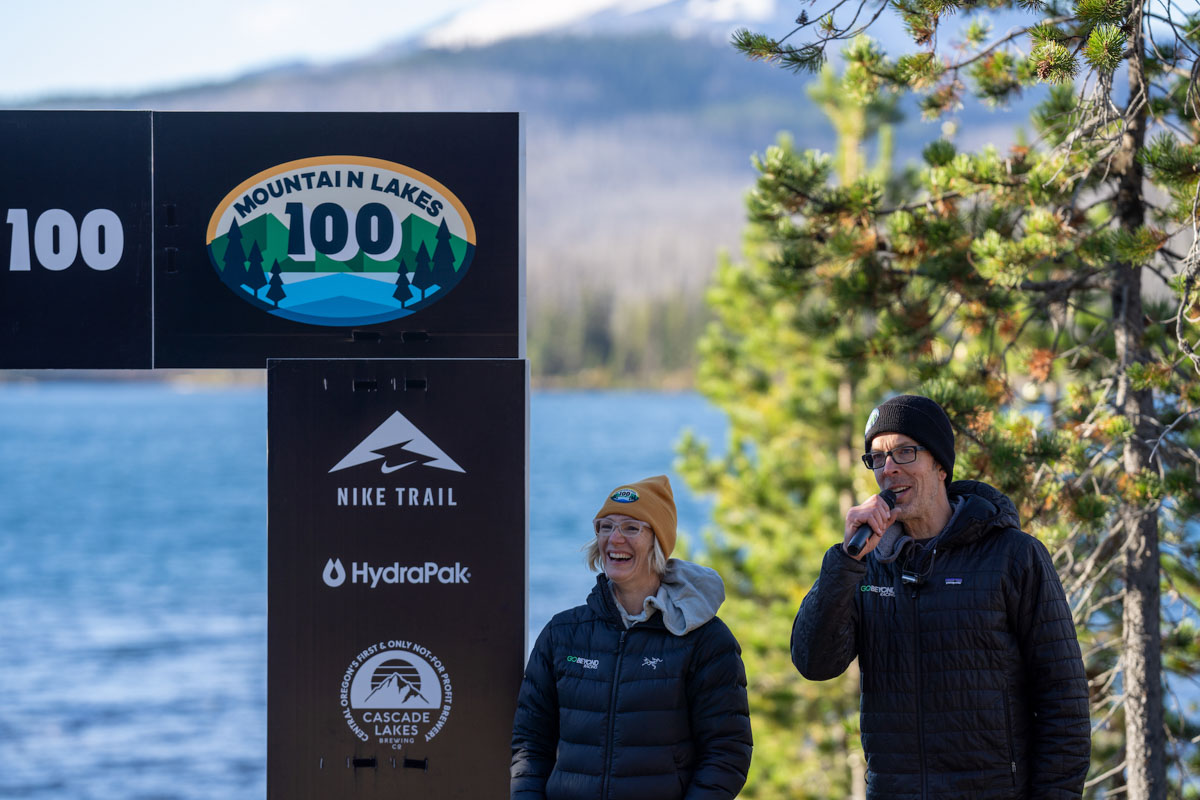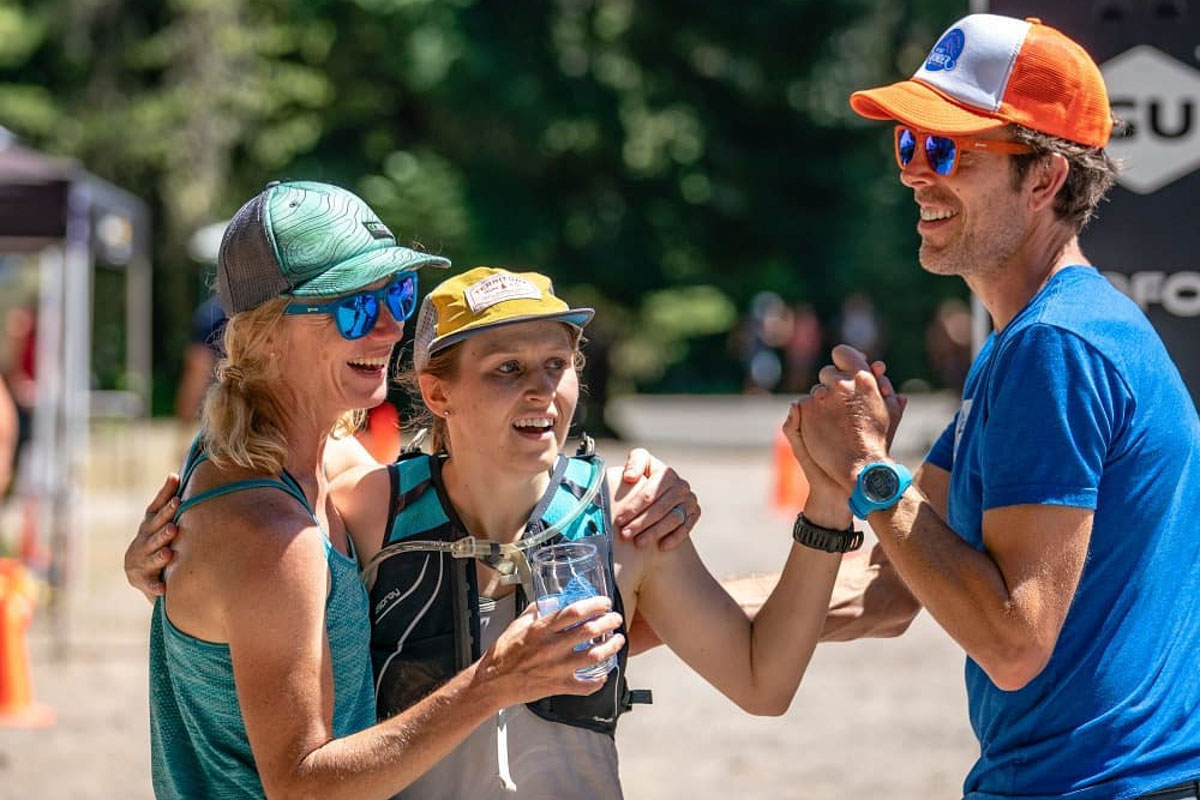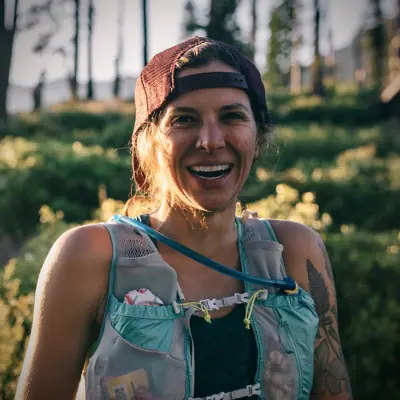Chances are that if you’re a trail runner in Oregon or Washington, you’ve probably raced in, or at least heard of, one of Go Beyond Racing’s events. Whether it’s one of their weeknight series races, a 100-mile event, or the Lastest Not Fastest last-person-standing event, Go Beyond Racing co-owner Renee Janssen said there’s “something for everyone who wants to run trails.” The goal is to ensure that every type of runner has a place at their events. According to Renee, “That’s purposeful, that’s why we offer some of these odd races.” Todd Janssen, Go Beyond’s other co-owner and Renee’s partner, added that for him, it’s about “seeing people finish a race when they thought maybe they couldn’t, or they did much better than they thought they could, or there’s special meaning because of a family member.”
From organized weekly races to 24-hour loop events and Oregon’s first 200-mile foot race, Go Beyond Racing has played a key role in building the trail running community in the U.S. Pacific Northwest, offering racing opportunities for over a decade. Todd and Renee have found their stride in providing something for every type of trail runner — including some niche race styles — while managing to not overextend themselves. In addition to organizing races, they also founded the Trail Mix Fund, a non-profit organization dedicated to improving diversity in trail running by removing barriers to the sport for underserved and underrepresented populations.
Todd and Renee’s involvement in trail running has evolved over time, from competing to timing events to race directing. Through these various transformations, they’ve remained committed to being involved in events that they believe in and making sure that everyone feels welcome.
The Road to Race Directing
While Todd and Renee share their love for trail racing and directing now, they developed their passions for the sport independently and uniquely.
Renee came into running as an adult. Growing up in a small town in Northeastern Oregon, Renee said, “We didn’t have a cross-country or soccer team,” though she played volleyball and basketball and ran track her freshman year. During college at Pacific University in Forest Grove, about 25 miles west of Portland, Renee’s accounting professor convinced her to run a 5k. “That’s when I kinda’ started running,” she said. Then, at her first job out of college, she was invited by colleagues to join their Hood to Coast relay team, where they ran nearly 200 miles from Mount Hood to the Oregon coast.
Initially, Renee was mostly running on roads. While spectating the Portland Marathon finish line in the early 2000s, she thought, “If they can do this, I can do this,” and signed up for the Las Vegas Marathon. Thinking she could run faster — a relatable sentiment among many first-time marathoners — she signed up for the next one. However, after just two marathons and a few triathlons, she realized she just didn’t love pavement. Or swimming.
Renee started venturing onto dirt with the Red Lizards, a Portland, Oregon-based running club. It wasn’t long before she raced the Mount Hood Scramble, an off-trail 10k following ribbons. It was, perhaps, a rude transition from smooth asphalt, but Renee was hooked. “I thought, ‘My ankles are wrecked, but this is so much fun; I want to keep doing this!’” She admitted, “That was the end of road running for me.”
As she got into trail and off-trail adventures, Renee also took up adventure racing, doing events that often incorporated running, orienteering, mountain biking, and paddling. “I was one of those super passionate people about it,” Renee shared. However, when she had twin boys in 2007, her focus and priorities shifted, and trail running and mountain biking became her primary activities.
Meanwhile, Todd spent his childhood playing outdoors in Nebraska and participating in “all the sports.” Later, as a teenager living in Redding, California, he was influenced by his older sister to join his high school cross-country team. During his sophomore year, when he was just 16, he ran his first marathon, saying, “I don’t even know if there was nutrition at the aid stations.” He continued dabbling in road races and the occasional marathon throughout his college years at the University of California, Davis. Todd ended up in Portland in 2008 after living in Japan for nine years and bouncing around the U.S. for a bit afterward. He soon ran the Stumptown 50k on Portland’s renowned Wildwood Trail in Forest Park as his first ultra. In the following years, in addition to racing more ultras, Todd also did some adventure racing. He also founded the chip-timing company Nspire that offered real-time results at roughly 50 events per year as well as a race registration platform.
Todd and Renee met through the Trail Factor run club sometime around 2010, and their life paths merged. Renee took on a marketing role at Nspire, but that was just the beginning.
Nspire soon started putting on events as well as timing them, and Todd and Renee quickly realized that their hearts were in directing trail races. Todd shared, “Putting on the races is more fun than timing the races.”
Go Beyond Racing
In 2013, both Todd and Renee were working for Nspire, timing and directing running races. They’d started the Portland Trail Series in 2011, semi-casual weeknight trail races that brought locals together and built community through competition and socializing at the trailhead afterward. They’d also taken over the Mount Hood 50, which now included a 50k and 50-mile event. In October, they decided to move away from race timing and focus fully on race directing, and they launched Go Beyond Racing.
Their first official race was the Stubby Chase at L.L. Stub Stewart State Park, which combined mountain biking and running in a checkpoint race where racers had to navigate to specific spots on the course. The event was eventually discontinued, and the duo moved forward with offering only trail running races. “I probably loved it more than Todd did, but it was a nod to our roots as adventure racers,” Renee shared. “But there wasn’t a lot of crossover between runners and mountain bikers in the Portland area at that time.” After Stubby Chase, Go Beyond took on the Stumptown 50k and Half Marathon, and it remains one of its most popular events.
Go Beyond soon created the Volcanic 50k, which circumnavigates Mount Saint Helens on the remote Loowit Trail. Other first-year races included Dog Mountain, which is now called The Ruff and run by another event organizer, the Elk-Kings 25k, Mountain Lakes 100 Mile, and Smith Rock Ascent.
While some races have disappeared over the years, Go Beyond has added others to replace them, including the Bend Trail Series and the Wy’east Wonder 50 Mile and 50k, which have become classics among Pacific Northwest trail runners. More niche races, such as the Wood You Rather Checkpoint Race, the Bristow 24/12/6 loop races, and the Lastest Not Fastest timed event, provide opportunities for runners to test their running fitness, endurance, and mental fortitude in creative ways. Among Go Beyond’s newest races was the Oregon 200 Mile — the state’s first 200-mile running race. After a couple of challenging years dealing with wildfires, Todd and Renee say this race is on hold as it is reenvisioned.
As they endeavored to offer fun experiences to the trail racing community, the race-directing duo learned through trial and error. “We tried things and failed, or tried things that other [event organizers] didn’t want to do,” said Renee. But they only took on races if they felt a connection to them. “We went by feel and added races where we liked to run and thought others would like it, too,” Renee added. “We need to feel … moved by the place or the trails in order to put on a race.”
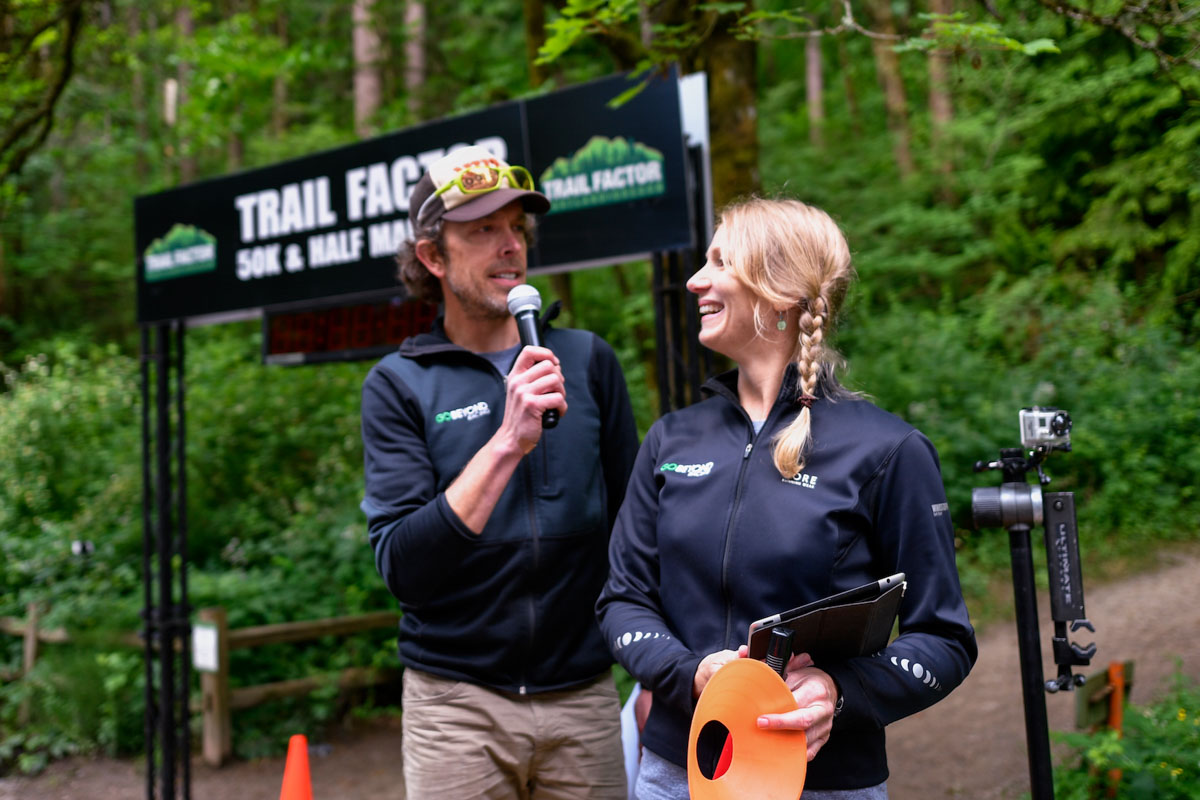
Todd and Renee make the pre-race announcements at the 2016 Trail Factor 50k and Half Marathon. Photo: Paul Nelson
Todd and Renee recognized that offering some of these more unusual types of races was a way to bring more runners into the trail racing community. Bristow, for example, is a one-mile loop that runners can repeat for 6, 12, or 24 hours. Go Beyond took over the event in 2019, but Renee said that initially, “The idea of a one-mile loop was like, ‘Forget it, no way.’ But then we crewed a friend there one year, and thought it was actually pretty cool. You get all kinds of people. You get people who can’t do other races because they’ll miss cutoffs, but they still want to run and see what they can do.”
Today, Go Beyond offers about a dozen races that provide something for nearly every trail runner, whether that’s a casual weeknight race with friends at the Portland Trail Series, as many loops as possible in a set number of hours at Bristow, or as many loops as possible until you miss a time cutoff at Lastest Not Fastest. Then there are the more traditional half-marathon, 50k, 50-mile, and 100-mile races on some of the region’s most stunning trails.
Trail Mix Fund and Non-Binary Race Categories
Even with such a variety of offerings, Renee and Todd recognized that running still needs to become more inclusive and accessible. In 2021, they launched the Trail Mix Fund, which helps cover race fees and other costs up to $500 for BIPOC and LGBTQ+ racers. Although the fund started with Go Beyond races, it now includes 75 participating races across the U.S. and Canada. “[The Trail Mix Fund] has helped bring visibility to this sport not being very diverse,” said Renee. The fund has had more than 600 applicants since its inception, and more and more races are coming on board. “Whereas before [some people] would not have felt welcome, the Trail Mix Fund gives people the confidence to show up. People show up and run and then continue racing.”
Additionally, Todd and Renee recognized that requiring race registrants to select a male or female racing category can be harmful and exclusionary to people who want to race but don’t identify as male or female. They’ve pushed hard — and continue to do so — to establish a non-binary racing category on race registration platforms. “It’s not perfect yet. There’s more work that needs to happen, but it was an important step,” said Renee. “People have told us that they go to register [for a race], and if there’s not a non-binary category, they won’t sign up. This makes it more welcoming.”
Looking Ahead
Certainly, race directing is more challenging than perhaps it used to be. As the sport has grown, so has the race calendar. Todd said, “I feel fortunate to have been able to do this for the past 15 years.” He went on to explain, “There are tons and tons of races now, and I don’t know if it would be the same trying to come into it now.” Some of Go Beyond’s former races were a little ahead of their time or were canceled due to complicated logistics, but Todd and Renee adapt as they go, and there are some changes afoot at Go Beyond in 2026. While the Oregon 200 Mile is on hold, runners are clamoring for the much-loved Elks-King 25k to return, which is something potentially in the works for next year.
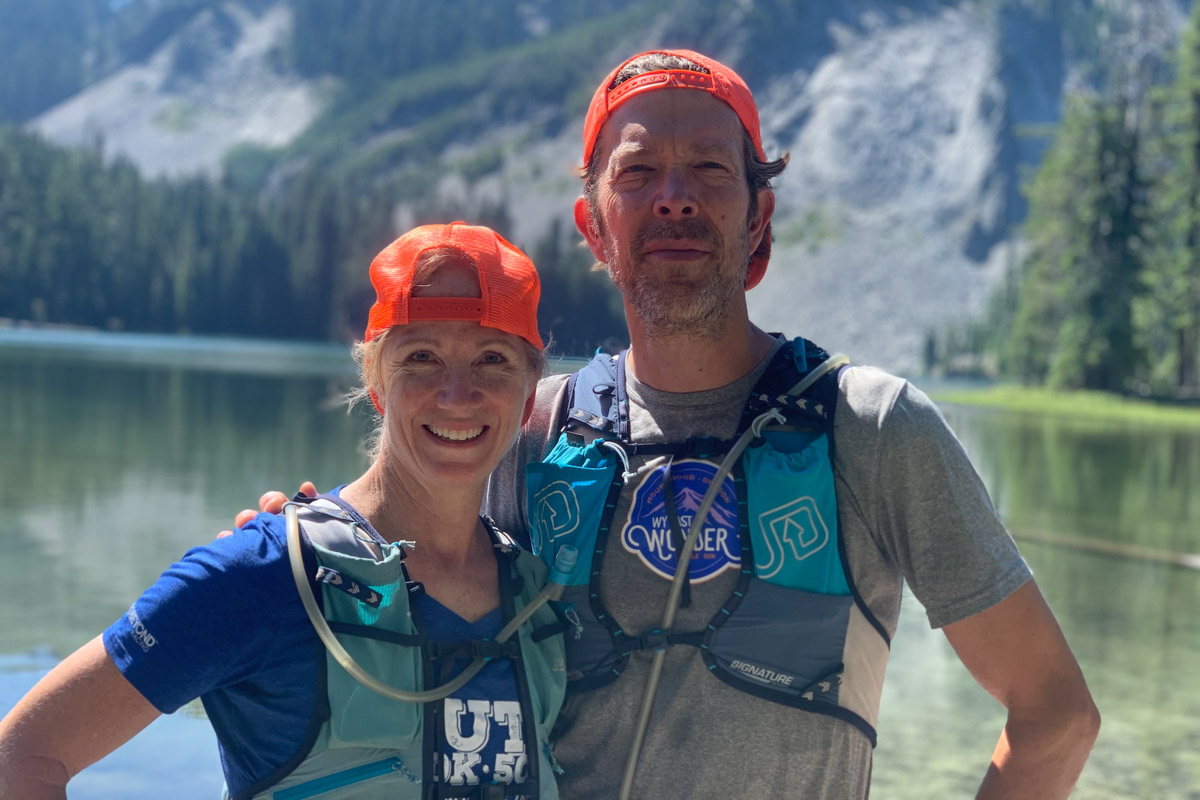
While their races take up much of their time, Renee and Todd still get out for runs together. Photo: Renee Janssen
What’s unchanged is how much Renee and Todd enjoy dreaming up races for the trail running community. Whether it’s hanging out around the trailhead after a Portland Trail Series race or welcoming each finisher who crosses the line, Todd said, “Time just sort of disappears.” Renee echoed the sentiment, “That’s where we get a lot of our joy.”
Call for Comments
- Have you participated in one of Go Beyond Racing’s events? How was it?
- Share a Todd or Renee story with us!
